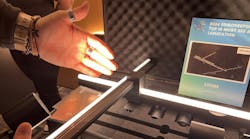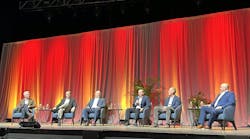ABB’s recently announced acquisition of Epyon B.V., a manufacturer of electric vehicle (EV) charging equipment, is the latest example of a mainstream electrical manufacturer investing in the development of electric vehicles. You may or may not believe electric vehicles will ever become a cost-effective solution to reducing the globe’s dependence on oil. But with millions of dollars being spent on EV R&D and acquisitions by blue-chip electrical manufacturers like ABB, GE, Leviton, Schneider, Siemens and Eaton, you can’t deny that EVs are now very much part of the electrical market.
Ulrich Spiesshofer, head of ABB’s Discrete Automation and Motion division, said the Epyon acquisition gives ABB access to competitive products, key network management software and a robust maintenance service business model. Founded in 2005, Epyon is headquartered in Rijswijk, Netherlands, has an R&D center in Eindhoven and sales resources across Europe.
Epyon’s DC fast-charging stations have been in commercial use since May 2010, and reduce charging time to 15 minutes compared to 6-8 hours using a standard alternating current (AC) charger outlet. The company’s equipment and software also enables the charging station owner to monitor conditions and requirements of the station, linking billing and administrative needs. It provides a range of different charging methods for each of the station connections, enabling it to tailor charging to various start conditions, power requirements and charging times. EV charging station unit sales are expected to multiply rapidly over the next five years, and reach 1.6 million units globally by 2015, according to Pike Research, the company said in a press statement.
ABB’s purchase of Epyon is its third recent move in the EV market. In 2010, the company made a $10 million equity investment in San Francisco-based ECOtality, and earlier this year entered into an agreement to allow ECOtality to utilize ABB sales distribution channels to sell its Blink electric vehicle (EV) charging stations as part of a complete EV solution to ABB’s network of North American commercial and utility customers.
ECOtality is project manager of The EV Project, a broad coalition of manufacturers, local governments and other entities interested in EVs that is involved in the installation of approximately 14,000 commercial and residential charging stations in 18 major cities and metropolitan areas in six states and the District of Columbia. ABB, Eaton, Nissan, Chevrolet and Underwriters Laboratories and other partners in the EV Project will help provide an EV infrastructure to support the deployment of 8,300 EVs. The project is funded by the U.S. Department of Energy through a federal stimulus grant of $114.8 million made possible by the American Recovery and Reinvestment Act (ARRA).
Over the past two years, several other electrical manufacturers began marketing EV products. Earlier this year Milbank Manufacturing, Kansas City, Mo., sealed a deal with AeroVironment, Inc., Monrovia, Calif., to provide the company’s electric vehicle charging stations to utilities, developers, contractors, businesses and consumers through Milbank’s nationwide distribution network. The EVSE systems are part of Milbank’s PowerGen line of renewable power solutions.
Siemens Energy Inc., Orlando, launched a new line of EV charging stations in Oct. 2010 that included systems for residential, public and commercial applications. The Siemens’ EV charging stations will integrate Coulomb Technologies’ ChargePoint Network, which includes 24/7 driver assistance, the ability to locate a charging station from any smart phone, the ability to detect charging station availability from a smart phone or Google Maps, EV trip mapping and driver billing.
Eaton Corp., Cleveland, is also active in EVs and is manufacturing charging stations in Wilsonville, Ore., that can recharge an electric vehicle to 80 percent of battery capacity in 15 to 30 minutes. Eaton and GE, Plainville, Conn., had their EV equipment on display at the GreenBuild show in Chicago last November. GE introduced its Yves Behar-designed WattStation electric vehicle charging station in July, 2010.
Leviton Manufacturing Co. Inc., Melville, N.Y., is also in EVs in a big way with its Evr-Green electric vehicle recharging products and services, which includes not only EV chargers but the necessary receptacles, wall boxes, receptacle safety covers, charging station brackets, and training for electrical contractors who want to become Ev-Green-certified installers. Schneider Electric has several major EV R&D initiatives underway but has not yet announced when it intends to start production of EV equipment.
The National Electrical Manufacturers Association, Rosslyn, Va., is also helping to lay the groundwork for the development of EVs in North America and according to a NEMA press release is hosting a meeting at the Underwriters Laboratories (UL) testing facility in Research Triangle Park, Durham, N.C., on July 20. The meeting will bring Canadian, Mexican and U.S. stakeholders together to discuss standards harmonization requirements for electric vehicle supply equipment (EVSE) used in North America.
Other drivers for the growth of EVs include government-funded initiatives. The U.S. Department of Energy (DOE) Office of Energy Efficiency and Renewable Energy (EERE) provides funding for EV research and there’s a bill in committee right now in Congress, H.R. 1685: “Electric Drive Vehicle Deployment Act of 2011,” sponsored by Rep. Judy Biggert (R-IL) that would provide additional incentives.
While it’s not a market segment ready to take center stage quite yet, EVs have also definitely caught the interest of electrical distributors and their customers. More than two dozen Top 200 electrical distributors told Electrical Wholesaling in a survey for the magazine’s annual ranking of the largest distributors in the electrical market that they either already stock or will be stocking EV equipment within the next year.








